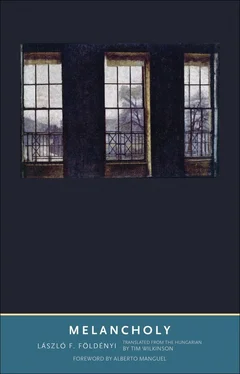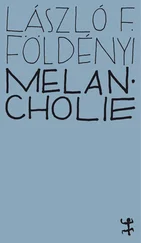The condition of Egyptian monks in the region of Alexandria drew attention to acedia in the fourth century, with Evagrius Ponticus naming it as the most serious of the (then still) eight evil thoughts ( capita cognoscitiva ) from which all sinful behavior springs. A monk in a state of acedia did not wish to remain in his cell, found work repugnant to him, and felt forsaken and inconsolable. Since acedia is not just a devilish suggestion but an evil spirit, a demon as well, the soul is compelled to experience hell. Thus, acedia is more than simple idleness: it is a sign of turning away from God, and it can be manifested just as much in sleepiness and laziness as in restlessness and instability. It is not of work that Homo accidiosus is tired, but of God’s oppressive almightiness; in vain he turns his gaze from God to the world, for instead of replenishment, from here too everything leads back to God. E. M. Cioran, a great melancholic of the twentieth century, writes about acedia as follows: “The dull sadness of monasteries wore an emptiness into the soul of the monks, known in the Middle Ages as acedia . . It is a loathing not of God but in him. Acedia gathers into itself the meaning of all those Sunday afternoons spent in the weighty silence of the monasteries” (Cioran, Tears and Saints , 86). According to Bonaventure, acedia has two roots: curiosity ( curiositas ) and disgust ( fastidium ). Disgust follows curiosity, and the initial question, “Is it worth living for God?” is quickly modified to “Is it worth living at all?” Aegidius Albertinus in the sixteenth century writes as follows in Lucifers Königreich und Seelengejaidt: Oder Narrenhatz ( Lucifer’s Kingdom and His Hunt for Souls; or, The Hounding of Fools ):
We legitimately compare acedia or sloth to a rabid dog’s bite; because a person who is bitten by such a dog is soon overtaken by frightful dreams, they shiver in their sleep, and they become rabid, refusing all drinks, fearing water, barking like a dog, and trembling so hard that they swoon. People like that soon die unless given help. It is those haunted by the devil of sloth that are bitten by rabid dogs: people like that have dreadful dreams, they tremble without reason; things which for others are easy they find difficult to do; they just gaze at the sight of others working and are themselves lazy; although they protest if they are called indolent.
(324–25)
St. Thomas Aquinas recommends numerous medications for the cure of acedia and
tristitia de bono spirituali divino
— searching for joy, crying to relieve spiritual tension, a sympathetic friend, sleep, baths, prayer — but these remedies by no means get at the roots of melancholy, the irresolvable conflicts attendant on being plunged into created existence. St. Thomas’s suggestions are designed to
conceal
melancholia, to hide sadness, while aiming indirectly at preserving the existing world order. (In the Middle Ages the royal court was also intolerant of gloom: that was the privilege of the court jester. He was allowed to be melancholic, to unveil the transience beyond every joy, the sadness inherent in all things. He did not have to be taken seriously, but he was needed as a sort of “safety valve.”)
It is sin that lurks at the very bottom of sloth and worldly sorrow: “This strife was against my will,” writes St. Augustine of the above-mentioned sickness of the soul, “but the punishment of my own. Thus it was no more I who did it, but the sin that dwelt in me” ( Confessions , bk. 8, 10). It was Adam who made humankind sinful, as a result of which, sin is a collective legacy of us all. St. Hildegard of Bingen (twelfth century), the “Sibyl of the Rhine,” who acquired fame through her prophetic visions and unusual spiritual experiences, saw the origin of melancholia in this shared sin: “What is now gall in him sparkled like crystal, and bore the taste of good work, and what is now melancholy in man shone in him like the dawn and contained in itself the wisdom and perfection of good works; but when Adam broke the law, the sparkle of innocence was dulled in him, and his eyes, which had formerly beheld heaven, were blinded, and his gall was changed to bitterness, and his melancholy to blackness” (quoted in Klibansky, Panofsky, and Saxl, Saturn and Melancholy , 80). (Of course, “black bile” meant “melancholy.”) In this view, then, melancholia was not an attribute of the individual, but of the genus humankind, and was born when the Tree of Knowledge was robbed. The consequences of melancholia are sorrow and despair, since humankind is incapable of forgetting paradise: in St. Hildegard’s understanding, it automatically extends to everybody. (Her contemporary William of Conches called the four temperaments “deficient forms”—referring to the mixture of man’s humors after the Fall, as opposed to the balanced mixture before.) But original sin as “deficiency” is not the same as the sin of a specific individual. In the case of melancholics, the sin is double, since in addition to the collective original sin, they are weighed down by individual sin; after all, they have rejected the good of their own free will as well, not only as a result of their being created. According to Roman Catholic theology, sin is a mysterium iniquitatis , a mystery of evil, as a result of which creaturely freedom may even set itself against God and choose evil. Choosing evil of one’s free will, the rejection of God, produces melancholia, but that melancholia only nominally resembles the melancholia springing from original sin . Even before making a choice of good or evil, a person, as a descendent of Adam, is guilty of original sin, but thanks to Jesus Christ, can find redemption. Thus, the possibility for individual decision is restricted to the space between these two points, and by choosing individual sin, one cuts oneself off from Jesus. From a medieval medical point of view, a mentally ill person — including a melancholic — can be cured of his illness by looking at a portrait of Jesus or Mary for a long time. That was why for lunatics there was an almost proverbial chant: Eamus ad videndum filium Mariae —“Let us see the son of Mary.” The tracing of the origin of melancholia to original sin and to the Christian anthropological interpretation of humankind provides nothing less than an existential explanation of human existence; melancholia stemming from individual choice, on the other hand, admits of a practical-ethical image of humankind — one that the Church persecuted vehemently, judging it an indication of sinners venturing a universal interpretation of existence. (At the beginning of the seventeenth century, yet still completely in the medieval spirit, Robert Burton too made a distinction between two kinds of melancholia: the universal sort, which is an inseparable aspect of being human, and a special melancholia, typical only of certain people.)
This dual conception of melancholia was far from clearly distinguishable to thinkers of the time; the two were intertwined, and in most cases “original” melancholia was also considered to be a mental illness. The interpretation of melancholia produced by St. Hildegard of Bingen or William of Conches went beyond other interpretations customary at the time: although they associated it with sin and with evil, in the last analysis they used it as a metaphor for humankind’s originally conflicted, precarious condition. This melancholia did not have its own special manifestation: the sorrow referred to by Hildegard, who was supposedly a melancholic herself, was not the “sadness” of the mentally ill but a consequence of the inevitable fate of being cast into the world and being created. Humankind elected sin of its own free will, says Hildegard, thereby predating Kierkegaard, who likewise brought the notion of “fear and trembling” into the context of original sin: Adam tasted the fruits of the Tree of Knowledge, but along with freedom he also chose to sin. According to Hildegard also, sin and free will were deeply connected (the nonmelancholic Anselm of Canterbury argued that only God and the good angels were free, whereas humankind was totally predetermined), and by relating melancholia to freedom of choice (even if in a condemnatory tone), she threw open a perspective on the interpretation of melancholia that was to resonate well beyond her own times. As long as it operated as a closed system, Roman Catholic theology, as has been seen, was able to integrate melancholia to a good purpose: by declaring that opposition and reticence, discernible at the root of every case of melancholia, were tantamount to madness and mental illness, this theology ultimately glorified itself. In the eyes of the general public as well, melancholia was irrational degeneracy. Medieval melancholics were the victims of a paradox, and the contradiction was not permitted to unfold, whereby it could have self-destructed through its freedom, but instead was ignored. Hence, the manifold modes of treatment that were proposed for melancholics, none of them radical, since in the end one could hardly abolish by purely physical means a condition that had been branded theologically. Treatments included “medications” like the flesh of an old cock, a ram’s head, a wolf’s heart, the water of the Nile, goat’s milk, whey, and also herbal remedies, such as “a simple potion of hellebore” (already in Strabo’s time hellebore was recommended against madness), bugloss (which was used in Homer’s Odyssey to bring forgetfulness to those suffering from the malady), melissa, borage, black salsify, cockscomb, marigold, lupin, artemisia, centaurea, pennyroyal, endive, wild chicory, dandelion, and fumitory.
Читать дальше












